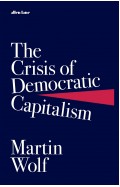The Crisis of Democratic Capitalism
By: Martin Wolf
-
Rs 2,636.00
- Rs 3,295.00
- 20%
You save Rs 659.00.
Due to constant currency fluctuation, prices are subject to change with or without notice.
We are living in an age when economic failings have shaken faith in global capitalism. Political failings have undermined trust in liberal democracy and in the very notion of truth. The ties that ought to bind open markets to free and fair elections are being strained and rejected, even in democracy's notional heartlands. Around the world, democratic capitalism, which depends on the determined separation of power from wealth, is in crisis. Some now argue that capitalism is better without democracy; others that democracy is better without capitalism.
This book is a forceful rejoinder to both views. It analyses how the marriage between capitalism and democracy has become so fraught and yet insists that a divorce would be an almost unimaginable calamity. Martin Wolf, one of the wisest public voices on global affairs, argues that for all its recent failings - slowing growth, increasing inequality, widespread popular disillusion - democratic capitalism, though inherently fragile, remains the best system we know for human flourishing. Capitalism and democracy are complementary opposites: they need each other if either is to thrive. Wolf's superb exploration of their marriage shows us how citizenship and a shared faith in the common good are not romantic slogans but the essential foundation of our economic and political freedom.
We are living in an age when economic failings have shaken faith in global capitalism. Political failings have undermined trust in liberal democracy and in the very notion of truth. The ties that ought to bind open markets to free and fair elections are being strained and rejected, even in democracy's notional heartlands. Around the world, democratic capitalism, which depends on the determined separation of power from wealth, is in crisis. Some now argue that capitalism is better without democracy; others that democracy is better without capitalism.
This book is a forceful rejoinder to both views. It analyses how the marriage between capitalism and democracy has become so fraught and yet insists that a divorce would be an almost unimaginable calamity. Martin Wolf, one of the wisest public voices on global affairs, argues that for all its recent failings - slowing growth, increasing inequality, widespread popular disillusion - democratic capitalism, though inherently fragile, remains the best system we know for human flourishing. Capitalism and democracy are complementary opposites: they need each other if either is to thrive. Wolf's superb exploration of their marriage shows us how citizenship and a shared faith in the common good are not romantic slogans but the essential foundation of our economic and political freedom.
Zubin Mehta: A Musical Journey (An Authorized Biography)
By: VOID - Bakhtiar K. Dadabhoy
Rs 472.50 Rs 1,050.00 Ex Tax :Rs 472.50
Myths Illusions and Peace: Finding a New Direction for America in the Middle East
By: Dennis Ross
Rs 876.00 Rs 1,095.00 Ex Tax :Rs 876.00
The Origins of Political Order From Prehuman Times to the French RevolutioN
By: Francis Fukuyama
Rs 3,116.00 Rs 3,895.00 Ex Tax :Rs 3,116.00
Manning Up: How the Rise of Women Has Turned Men into Boys
By: Kay Hymowitz
Rs 646.75 Rs 995.00 Ex Tax :Rs 646.75
The Obama Syndrome: Surrender At Home War Abroad
By: Tariq Ali
Rs 1,036.00 Rs 1,295.00 Ex Tax :Rs 1,036.00
The Quest For Meaning: Developing A Philosophy Of Pluralism
By: Tariq Ramadan
Rs 1,116.00 Rs 1,395.00 Ex Tax :Rs 1,116.00
No similar books from this author available at the moment.
No recently viewed books available at the moment.
Zubin Mehta: A Musical Journey (An Authorized Biography)
By: VOID - Bakhtiar K. Dadabhoy
Rs 472.50 Rs 1,050.00 Ex Tax :Rs 472.50














-120x187.jpg?q6)







-120x187.jpg?q6)





